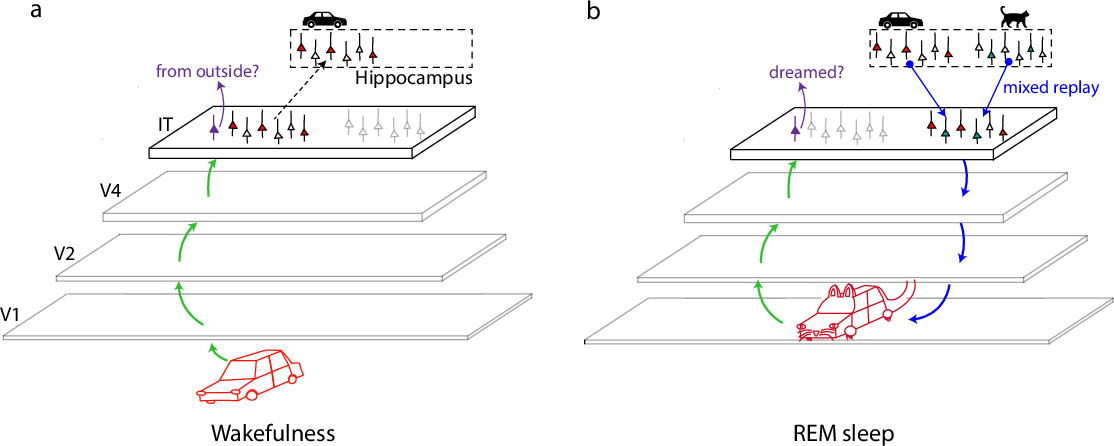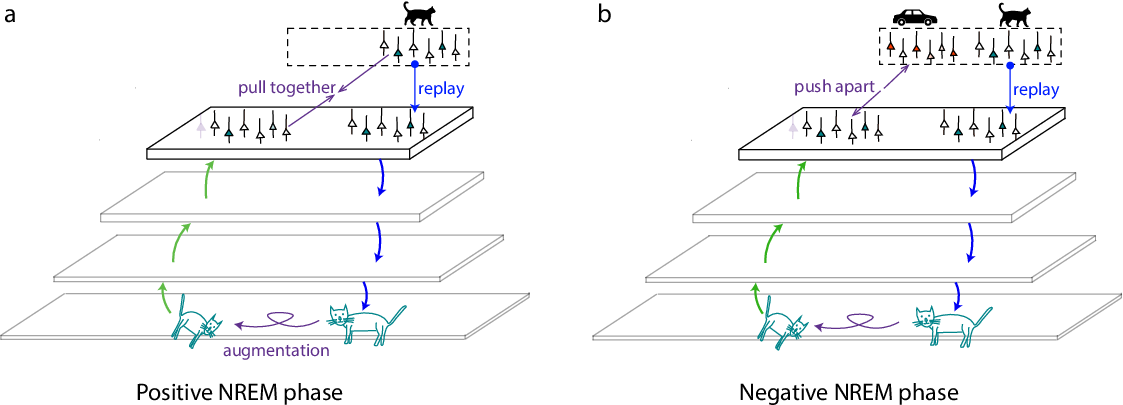- The paper introduces adversarial and contrastive dreaming as mechanisms to enhance neuronal representation through virtual experience replay.
- The framework uses a GAN-inspired approach during REM sleep and contrastive methods in NREM sleep to refine semantic organization.
- Key findings suggest that integrating predictive, adversarial, and contrastive principles improves object category discernment and resilience against sensory perturbations.
Learning beyond sensations: how dreams organize neuronal representations
Introduction
The paper entitled "Learning beyond sensations: how dreams organize neuronal representations" (2308.01830) explores the hypothesis that virtual experiences, such as dreams, are instrumental in shaping semantic neuronal representations in higher cortical areas. These representations enable robust and adaptive behavior and are typically acquired through unsupervised learning over an organism's development. The authors propose two learning principles: adversarial dreaming and contrastive dreaming, which leverage the cortical generation of virtual experiences to refine neuronal representations beyond classical predictive processing paradigms.
Adversarial Dreaming
Principles of Adversarial Learning
Adversarial dreaming operates on principles akin to GANs, where a generative process (analogous to a feedback pathway in the brain) creates virtual experiences, and a discriminator (analogous to a feedforward pathway) evaluates their realism. The feedback pathway endeavors to produce experiences indistinguishable from real-world stimuli, while the feedforward pathway learns to differentiate between real and imagined inputs. This dynamic fosters the development of nuanced, high-quality internal representations by progressively minimizing discrepancies between generated and actual sensations.

Figure 1: Learning representations via adversarial dreaming.
Implementation and Effects
Leveraging replayed hippocampal memories during REM sleep, adversarial dreaming involves generating creative mixtures of memory elements to simulate novel experiences. This process enriches cortical representations by refining the generative model's realism, ultimately yielding more semantically organized representations implementable via synaptic weight adaptations. The framework's functional outcomes include improved object category discernment and heightened robustness of representations against sensory perturbations.
Contrastive Dreaming
Principles of Contrastive Learning
Contrastive dreaming is predicated on the direct training of cortical feedforward pathways to produce similar responses to semantically similar stimuli. Using techniques analogous to contrastive learning in machine learning, sensory representations are aligned by leveraging augmentations of replayed experiences. The process involves "pulling together" similar experiences while "pushing apart" dissimilar ones, thereby maintaining cohesion in representations of semantically analogous inputs.

Figure 2: Learning representations via contrastive dreaming.
Implementation and Effects
During NREM sleep, memories are replayed with augmentations, potentially including distortions, rotations, or other transformations, which allow the cortical networks to learn invariant representations robust to these modifications. This approach not only reinforces the encoding of semantic information but also enhances resilience to distortions encountered in new sensory inputs.
Putting It All Together: Predictive, Adversarial, and Contrastive Principles
The integration of predictive, adversarial, and contrastive learning principles presents a cohesive framework for understanding how the brain synthesizes experiences to acquire semantic representations. Predictive processing optimizes the brain's capacity to anticipate sensory inputs, while adversarial dreaming extends the boundaries of these experiences through creativity during REM sleep. Contrastive dreaming refines the resilience and adaptability of representations during NREM phases. An interplay among these paradigms could synergize the acquisition of structured, high-dimensional representations crucial for behavioral adaptability.
Conclusion
The exploration of dreaming as a mechanism for organizing neuronal representations underscores the significance of virtual experiences in cognitive development. By elucidating the processes of adversarial and contrastive dreaming, the paper offers insights into potential neural implementations and functional behaviors fostered by dream states. The implication is that dreams contribute significantly to learning processes, supporting the construction of organized, semantically-rich representations necessary for effective interaction with the environment. Further research into the integration of these frameworks may enhance our understanding of the neural underpinnings of cognition and foster the development of more sophisticated artificial neural systems.



